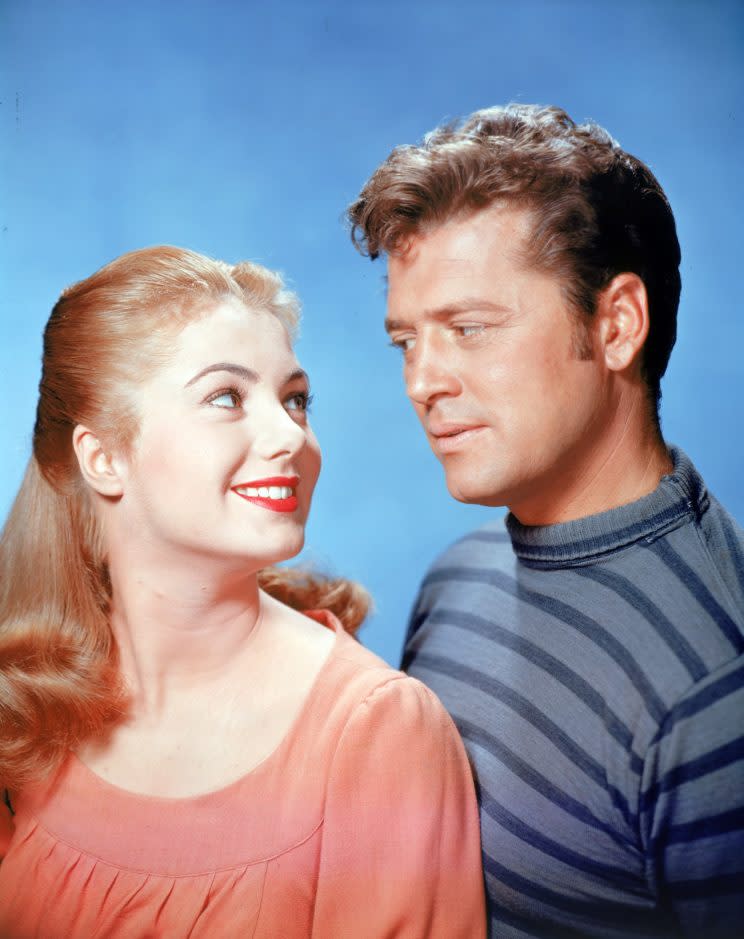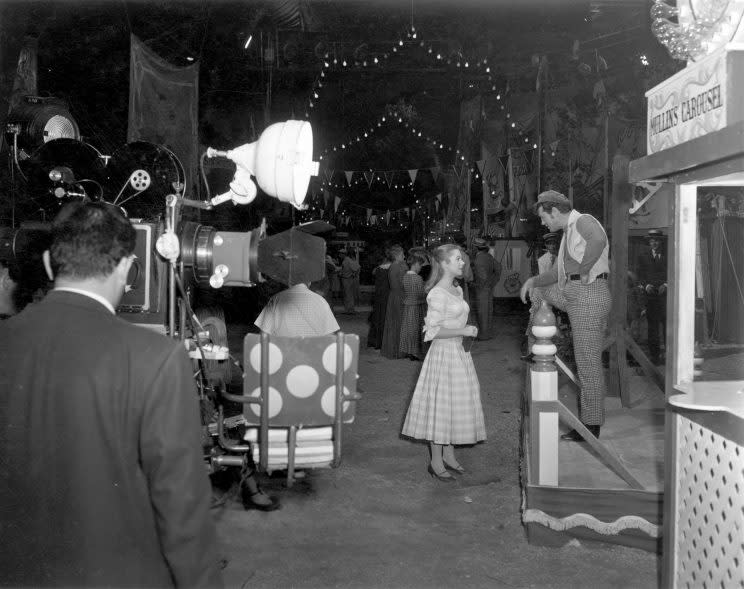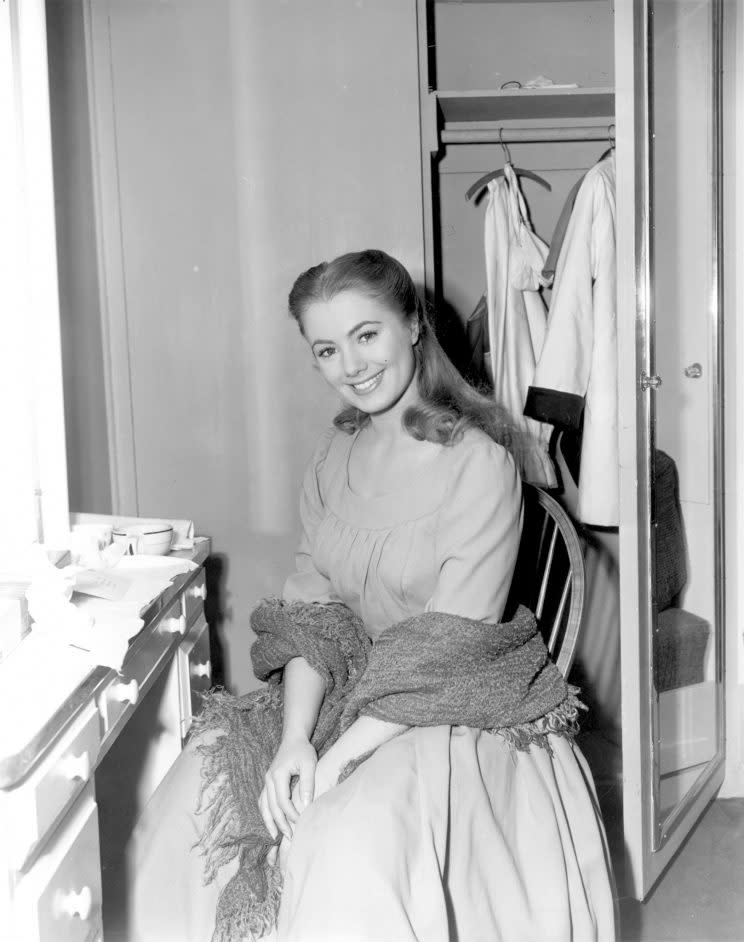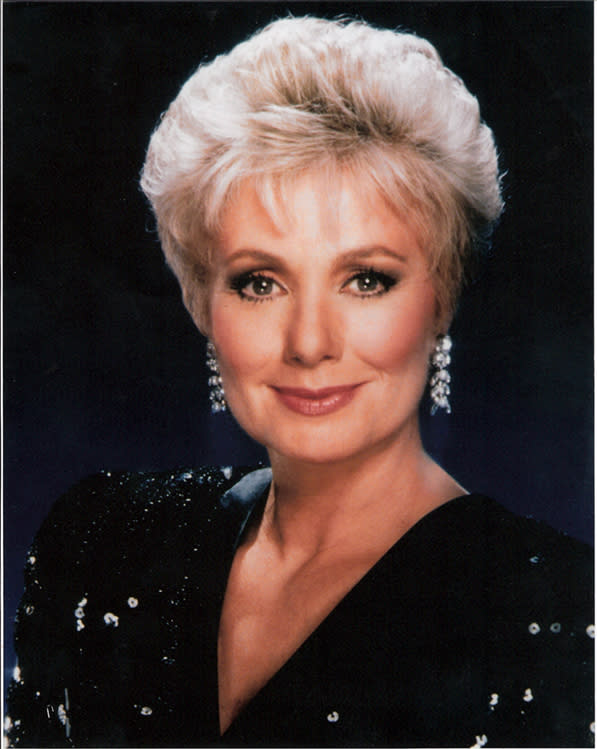'Carousel' Returns to Theaters: Shirley Jones Shares Set Stories — Including Why Frank Sinatra Quit the Movie

The 1956 film Carousel (playing in select theaters today) is best remembered for bringing the Broadway show’s classic Rodgers and Hammerstein songs, including “You’ll Never Walk Alone” and “If I Loved You,” to the big screen. The story of a doomed romance between innocent Julie Jordan (Shirley Jones) and worldly carnival barker Billy Bigelow (Gordon MacRae) in a fishing town in the late 1800s, Carousel hasn’t entirely aged well; a plot point about Billy hitting Julie, which she seems to take as evidence of his love, is particularly difficult to stomach. That aside, the film still dazzles with its candy-colored cinematography (it was filmed on location in Boothbay Harbor, Maine), epic dance sequences, and lushly orchestrated score.
With Fathom Events bringing Carousel to theaters for a 60th anniversary screening (go here for showtimes), Yahoo Movies had the opportunity to speak with star Shirley Jones. Now 82, the Oscar-nominated actress dished on Carousel’s behind-the-scenes drama (her original co-star, Frank Sinatra, walked out on the first day of filming), the challenges of being a young woman in 1950s Hollywood, and the experience of seeing her 22-year-old self in theaters again.
Watch a trailer for the Fathom Events screening of Carousel:
Yahoo Movies: So Carousel is back in theaters.
Shirley Jones: I’m thrilled! I went to a screening this weekend at Universal; my youngest son, Ryan [Cassidy], came with his wife and my granddaughter, and he and I both sat there throughout the whole film crying! [Laughs] I said, “I’m the one who’s supposed to be crying, not you!” It was wonderful. I mean, I almost say to myself, “Who is that person?” But it’s my favorite score of all the things they wrote, Rodgers and Hammerstein.
It could have been a very different film, though! Originally, Frank Sinatra was supposed to play Billy Bigelow.
He pulled out after we did the prerecordings and everything else, because Ava Gardner was threatening to have an affair with Clark Gable if he didn’t come to the location.
That always works for me. If I want someone to come to where I am I say, “I’m going to have an affair with Clark Gable if you don’t get over here.”
[Laughs] Exactly! But you know, when I saw the film again the other day — I mean, nobody sang like Gordon MacRae. [MacRae died in 1986.] That voice was so beautiful. When I was 15 years old, I used to listen to a radio show called The Teen-Timer’s Club on Saturday morning, and he sang on the show, and I fell in love with that voice. So you can imagine what it was like to work with him. He gave me chills every time I heard him sing.

But you did a fair amount of work with Sinatra, right? You recorded all the songs.
We did all the prerecording. That’s what you did — you prerecorded every song, and then you sang with the prerecording. And we did all the rehearsals. Back then, when they did a movie musical, you rehearsed it really almost like a Broadway show. You rehearsed for months before you started shooting. And I did all of that with him too. And to have him walk out when we were just about to shoot the film was really unbelievable. We were in Boothbay Harbor, waiting for him to arrive for the first shoot, and we got a [message that] he wasn’t going to come. He’s pulling out of the film. Well, I mean everybody — the producers, it was a married couple that produced it, and she started to cry. And I was on the dock. They said, do you know where [Jones’ Oklahoma! co-star] Gordon MacRae is? And I said, “Yeah, he’s in Las Vegas doing a nightclub act.” They said, “Can you get him on the phone?”
And they gave me some quarters. I was on the dock, and I put the money in a payphone, and I got him on the phone and I said, “Gordon, how would you like to play Billy Bigelow in Carousel?” He said, “Give me three weeks, I have to lose 10 pounds.” I said, “We don’t have three weeks!” And that’s how that happened. I mean, it was bizarre.
So did you all just hang out for the time it took him to get there?
Yeah, it took about a week and a half, and then he finally arrived. I think what they did was they shot other scenes. We had a lot of other scenes without the two leads involved.
Watch a dance sequence from the 1956 film Carousel:
And what did you do?
I sat and watched everything. [Laughs] I was overwhelmed by the dancing, and when I just saw the film again the other night, the dancing is so beautiful. And I got to see it live. That’s all I did, I just sat there and watched them dance, and I was so thrilled watching them.

Having rehearsed with Sinatra and then filming with Gordon MacRae, who was a friend, did that change your performance or the way you approached the character?
Not at all. You work with different actors all the time, and so you sort of get to know how they’re going to react and what kind of an actor they are. And of course, I knew Gordon very well. Gordon wasn’t as sly and didn’t have the the bad-guy look that Sinatra had every minute. But still, it was great for me to work with Gordon again. And you know, I was scared to death of Frank. [Laughs] I wasn’t sure about him. I thought, “How is this going to work out?” He was always asking me to come to his dressing room, and he’d come out of the shower with a towel wrapped around him, and I’d say, “Oh. Wonderful.”
Having read your memoir, it sounds like a lot of your early career was spent fending off unwanted advances. Like that was just part of your process: You’d go to set, and then you’d have to turn down all these men, and then you could get to work.
That’s exactly right. Every young woman who started out in movies, you know, they all went through that. I mean, everybody did. I was told that before I even went to the set — you know, so-and-so does this, and he’ll invite you to the room, so be aware of what’s going to happen. I was told that by everybody. And that is exactly the way it worked.
So one thing about Carousel is there’s this whole plot thread about how Billy has hit Julie. And that part of the story hasn’t aged so well, to put it mildly.
Absolutely not, no. I’ll tell you one thing about that. I was in New York City, and they had a huge screening of Carousel at one of the big theaters there about 20 years ago. It was as an event to raise money and stuff like that, and everybody dressed up in wonderful attire. I went to the matinee, and most of the matinee was women. And halfway through the film, about five or six or eight women got up and said, “We’re leaving! How dare they do a movie like this about women!” And they left.
What would you tell younger audiences about that aspect of the story?
I mean, young women today would say, “Oh, please. This is insane.” But you know, the adoration and love that I [as Julie] had for this man, I had never had for anybody.
There’s been talk of a Carousel remake floating around for a while. Hugh Jackman was attached at some point.
I don’t think they’ll make it again. I honestly don’t think so, because of what we were just talking about: The women would get up and walk out. [Laughs] The thing that makes it exist and makes it so important is the music. When I did my nightclub act, and when I did my shows in Vegas, that was all I ever sang, basically — that entire score. And so I think that would be reason people would see the film, just to hear the music again. And Hugh Jackman would be wonderful, naturally. He’s incredible. I did a concert with Hugh Jackman in London when I first met him, and he was so darling.

Any other thoughts you’d like to share about seeing the film again?
I’m amazed that they brought it out again! I’m thrilled that they have. I’m interested to hear what people say about the movie now. The score they’ll love — I mean, I’m sure they will, because that music will be around forever.
Watch Shirley Jones and Gordon MacRae sing the duet “If I Loved You” in the 1956 film Carousel:
Related: Yul Brynner’s Daughter Shares Memories of Growing Up With The King and I

